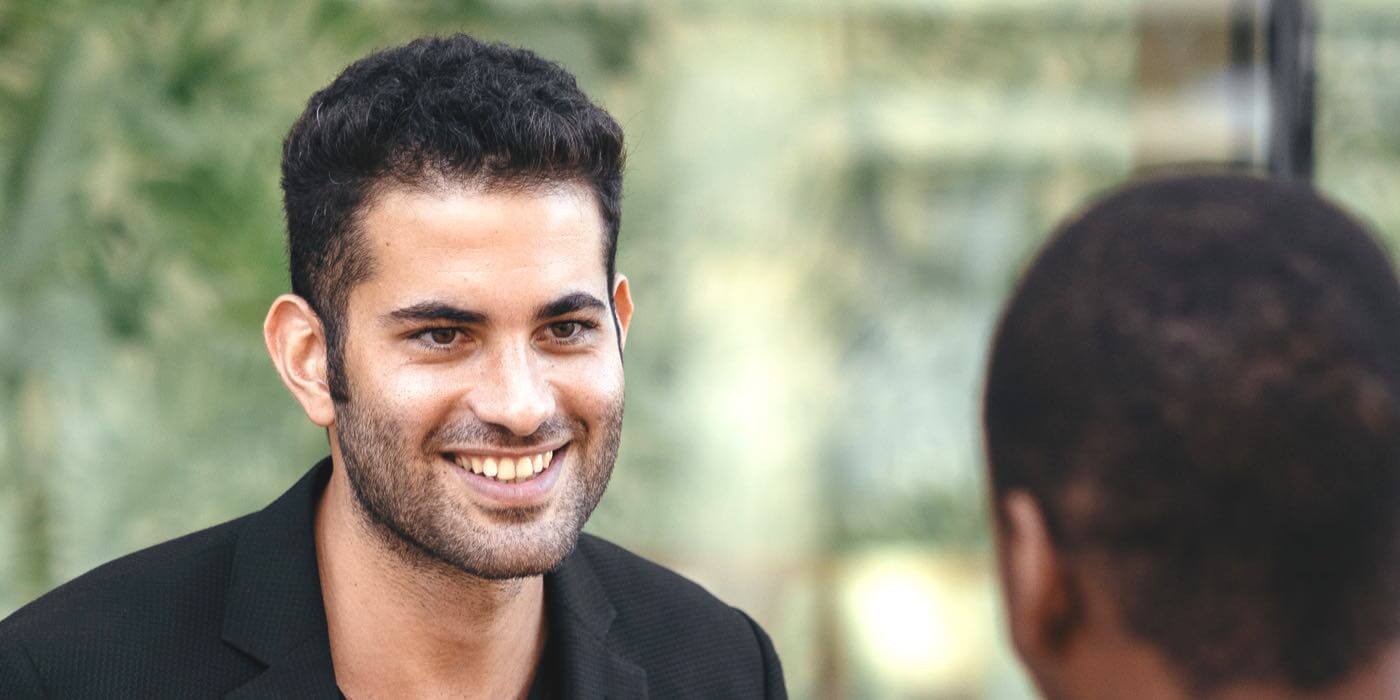You always hear people talk about how important it is to “be a good listener.” But you almost never hear specific advice for how to actually do it.
In the rest of this article, I’ll introduce you to four simple skills you can learn to improve your capability as a listener. Based on a well-tested set of techniques from psychology called motivational interviewing, these skills will help you to create more satisfying and effective relationships in your life by becoming a better listener.
Whether you’re trying to work through a difficult conversation with your spouse or negotiating a raise at work, the art of effective listening is key to better relationships.
1. Open-Ended Questions
Open-ended questions encourage the person across from you to elaborate and tell a story. They’re the opposite of closed questions which can be answered with a simple “yes” or “no” statement.
For example:
- You and your spouse are trying to decide where to send your son to school next year and you disagree strongly on the best choice and tonight’s the “big night” when you finally sit down to have what you are both expecting with be a difficult conversation. Your spouse lays out their case for why they think you should send your son to “their” school.
- A closed question would be something like Are you sure a STEM school will really be in his best interest given his passion for art and design? A closed question like this is basically the equivalent of leading the witness… Since your spouse is unlikely to magically change their mind completely and say no, their only other option is to simply say yes. Which isn’t all that productive.
- Alternatively, you could ask an open-ended question like this: Tell me a little bit about what kind of opportunities for art and design they have there?
There are many benefits to getting in the habit of asking open rather than closed questions but one of the biggest is this:
Open-ended questions reduce defensiveness.
Closed questions often make people feel like they’re a witness being cross-examined in a courtroom. And so understandably, it tends to make them defensive. And as you probably know, the minute someone starts getting defensive, the odds of the conversation going well drop dramatically.
On the other hand, by inviting the other person to elaborate and tell their story, you are communicating to them that you’re interested in their point of view. This has a profoundly disarming effect and tends to reduce defensiveness, and as a result, increase the odds of the conversation proceeding productively.
Here are a few examples of good generic open-ended questions you can use:
- Can you help me understand _______?
- Can you tell me a little bit about how you came to that idea/belief/decision?
- What are some of the factors that went into you feeling like this?
- What have you tried in the past?
- Interesting… can you tell me a little more about that?
- What do you think might be some different possibilities going forward?
- What are some reasons you think _______ hasn’t worked in the past?
- Can you share the origin story of _______?
- What part of _______ is most difficult for you?
2. Affirmations
Affirmations are simple statements that affirm or reinforce the positive in the other person or their story.
For example:
- You’re in a difficult conversation with your boss about a project that’s behind schedule and causing everyone on the team a lot of stress.
- Your boss describes all the things they’ve done to try and get it back on track without success.
- An affirmation might be something like: Yeah, most of those didn’t work, unfortunately, but actually, your decision to move Jen onto the team to help has been really helpful. She’s had some really good ideas that haven’t moved the needle yet but I’m pretty sure are going to be helpful soon.
When we need to be a good listener, it’s often because a situation is challenging and full of problems. And sometimes, the fact that we’re exclusively focused on the problems and what’s not working becomes itself the problem. Which is why affirmations are so powerful…
Affirmations build confidence that things can improve.
So many difficult conversations go bad because one or both parties lose hope that things can get better. And when people lose hope, the conversation tends to become highly unproductive.
But no matter how many challenges there are to be addressed, your best odds of doing so effectively are when people feel confident that they can succeed despite the challenges.
Here are a few examples of affirmations you can use:
- That’s actually a really good question…
- What you said earlier about _______ was really insightful…
- It sounds like that was a really difficult situation for you, but it sounds to me like you handled it as well as you could.
- I can tell you’ve really spent a lot of time thinking about this.
- Despite how much we disagree, I really respect how deeply you care about this.
3. Reflective Listening
Reflective listening is a deceptively simple skill that helps you avoid communication breakdowns and fosters empathy.
Instead of trying to explain it conceptually, here are a few examples of what reflective listening actually looks like:
- After hearing your spouse describe how upset they were at their manager today, you say: Wow, sounds like it was a really frustrating day.
- After listening to your manager describe their version of the problem with the final report getting done, you say: So it sounds like you see _______ as the key sticking point?
- After your business partner confides in you that they’re really unhappy in their romantic relationship at home, you say: It seems like you’re really afraid that your marriage won’t last…
While it might seem simple or even condescending, reflecting back what you hear the other person saying or feeling in your own words is a critical skill for being a better listener because it accomplishes 3 key things:
- You avoid miscommunication. It’s surprisingly easy for one person to say something and the other person to end up “hearing” or taking away something slightly but importantly different. When you periodically reflect back what you’re hearing, you minimize the chance of miscommunication and later breakdowns.
- You express empathy. Even though the other person already intellectually understands what you’re reflecting back to them, reflections work on an emotional level as well. Specifically, they help the other person to feel heard and understood by you, which is vital especially in emotionally charged situations.
- You build trust. Reflecting back what you’re hearing not only communicates information it also communicates trust. When we take the time and effort to reflect back what we’re hearing, it shows the person that we’re listening actively, not just passively.
Here are few reflective listening scripts you can use:
- It sounds like you’re struggling with _______
- It seems to me like you’re feeling _______
- So, you’re wondering if _______
- Looks like you’re confused about _______
- I can tell you’re really having a hard time with _______
- You seem really excited about _______
4. Summaries
Summaries are a specific type of reflection that encapsulate broader themes or wider timelines. They are especially useful at transition points or endings of conversations.
A few examples of summaries:
- Okay, let me just make sure I’m understanding: It seems to me like the biggest frustration with your job is _______.
- Wow, that’s a lot! Just to make sure I’m clear, the three most confusing parts of this dilemma are _______, _______, and _______.
- What I hear you saying is that you’d like to _______ but _______ keeps getting in the way.
In many ways, summaries are the most difficult skill to master because they require close attention and thinking about what the other person has been saying over time and across topics. Then, you need to translate and articulate what you’ve heard into a faithful but concise version. No easy thing!
But with that difficulty comes power: Being a good summarizer is an incredibly effective way to validate the other person in the conversation because it proves that you’ve been paying attention deeply and consistently. And when other people feel that—that you’re deeply listening and attentive—very good things tend to happen.
The other benefit of a good summary is that often hearing your own thoughts condensed and reflected in a slightly different way helps you make connections and insights you would otherwise have missed. In other words, once you get good at summarizing, you’ll find that they actually help create new insights and understanding.
All You Need to Know
One of the best ways to create deeper, more satisfying, and more effective relationships is to improve your abilities as a listener. Using these four skills from motivational interviewing—remember the acronym O.A.R.S. if it’s helpful—you can quickly become a far better listener:
- Open-ended Questions
- Affirmations
- Reflections
- Summaries





13 Comments
Add YoursThank you so much share great insights. For me, recently I trying to listen carefully other people’s talk. Originally, I thought that I paid attention listen when other people are say. But I realized that I’m not good paid attention listener to other’s say. From now, I will trying to more pay attention hear other people’s say and tell to more open-ended questions.
Hi
Tks for your very interesting articles. To day I clicked on your first topic and proceeded, even though every time I click on a topic a warning saying that it is unsafe to open comes up. Can this be omitted or why does this come up all the time. I love your subjects.
Sorry about that, Antoinette. What internet browser are you using?
Wow Nick..what a great read on “active and passive” listening! It all makes so much sense the way you laid it out. I felt like I was in therapy and I should pay you! (insert smile emoji here) Seriously, all your articles are really good, but this one, I have to say…Great job!!! I’ll be remembering that acronym O.A.R.S.
I really appreciate the work you’re doing, Nick. The knowledge you give is priceless. Keep the good work up. P.S. I would love to see all your ideas in one place i.e. you writing a book and publishing it. Because I can tell that you spend a lot of time working on these articles which are very insightful, so why not write an complete book filled with with all of your ideas and so-called life hacks?
thank you for this wise and good article; it is truly helpful, good communication is so precious – in different ways, myself and other people have to communicate more well with each other in different ways; and often there is background to people’s understanding of different things, i am so busy right now and late in time with many things i have to do online, yet problems with my account, and i have had to do so much to get getting wi-fi back using different networks, and have kept on loosing wi-fi, and going through so much in my life right now and have so much to do – including communications about my youngest very wonderful and autistic son who lives far away in what is like a village for people with special needs; wish me wish, and many communicate by sign language aswell as different spoken languages, and we should understand other animals more, anyway, well done for this article.
Thanks Nick! Really appreciate your clear and simple suggestions, only need to use them in a timely fashion!
Sharon
Ps please remove my last name from my quote… sharon
????????
Hi Nick! Do you have any general tips regarding people having a fair argument. (Respect, one person speaking at a time, no name calling etc.) I’d really appreciate it.
I think this is excellent! I wish it could be given to all new parents as part of a going home package with the baby! I would have a much better relationship with my adult children now if I had been a better listener. Thank you, Nick! Never too late to start! ????
This is one of my favourite article…. Because i often find myself saying that people don’t listen to me… But at the same time i too don’t listen to people and this will make a huge difference on the conversations that i am having…..
Great comprehensive education on human communication. Anyone reading your articles can only improve their/our skills if we apply your information.
I’ll have to refer to these communication skills and self understanding on a very regular basis.
I now understand why I get on other peoples’ nerves!!!
I’m not a bad person but I am an ignorant one without realizing why.
Not any more.
Your insights are invaluable to those willing to do the work.
Thank you so much Nick.